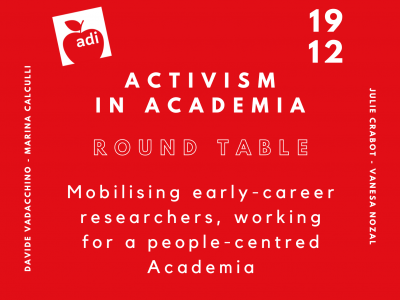
Notwithstanding that challenges faced by PhD candidates and early career scholars are diverse among European countries, the neoliberalisation of Academia is a global phenomenon and a widespread issue.
The application of corporate logic to research professions results in the impossibility to cope with life-work balance, with increasingly harsh competition (which holds significant consequences on mental health), and determines a situation of entry barriers to the profession for low-middle income people.
Difficulties in accessing scholarships and grants, the absence of a contract, difficulties to live on an income that is below the cost of living, high expectations on the amount of work we are asked to do in order to grant ourselves a possible career, arbitrary relationships with supervisors and challenges to the freedom of our research in a world where often private investments are growing over the public ones, are only few of our common struggles.
In this complex and draining scenario we precariously try to build a future for ourselves but often find the resistance of the system, may that be the universities or the governments, if not both.
To counterbalance these tendencies, it is clear that our category (i.e. workers of Academia, research workers) has to share a critical approach towards the way the profession is conceived and the goals we should set. Unfortunately, the research career is often a lonely one, leading individualism and competition to be the main values to be deployed. On the other hand, many colleagues are now organising, mobilising and asking for different professional conditions, alongside a different idea of what academia should be. Some are asking to democratise its structures, some to raise their salaries, some for a better work-life balance, some are holding hands with students to prevent academia from being a classist environment.
As ADI, the Association of PhD candidates and early career scholars in Italy, is approaching its 25th birthday, we would like to explore the birth and growing of activist experiences in Academia around Europe. We invited some scholars who are also engaged at various levels in activism in order to better their conditions. The aim of this debate is to grasp better practices of colleagues in different countries by asking them about their experience (whether with social movements, or informal groups or established unions etc.), their goals in mobilising researchers, their successes and/or loss, and, eventually, how they think we need to move forward. This will help to set a common agenda, to ameliorate our advocacy practices, and to enhance our knowledge on how Academia can be transformed in a people-centred environment.
Moderator:
- Ludovica Xavier de Silva, ADI National Direction and Delegate to Participation, well-being, intersectional activism
Speakers:
- Rosa Fioravante, National Secretary, Associazione Dottorandi e Dottori di Ricerca in Italia (ADI) – Italy
- Davide Vadacchino, Member of University and College Union (UCU) – UK
- Marina Calculli, Founding member of Casual Leiden – Holland, Netherlands
- Julie Crabot, President of Confédération des Jeunes Chercheurs (CJC) – France
- Vanesa Nozal, President of Federación de Jóvenes Investigadores (FJI Precarios) – Spain
- Irini Thanou, President of Πανελλαδικό Σωματείο Εργαζομένων στην Έρευνα και την Τριτοβάθμια Εκπαίδευση (Nationwide Unione of Employees in Research and Higher Education) – Greece
- Patrizia Ferrante, Member of Eurodoc Board
Pubblicato Lun, 12/12/2022 - 20:44
- Accedi o registrati per inserire commenti.